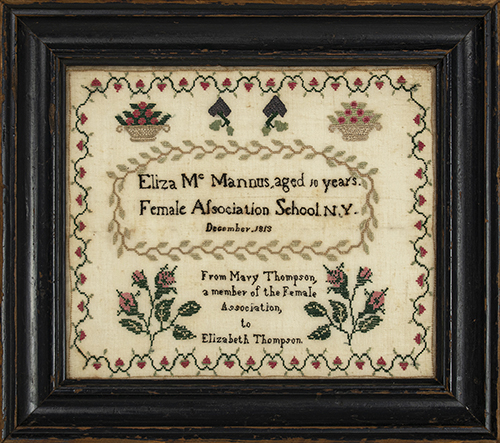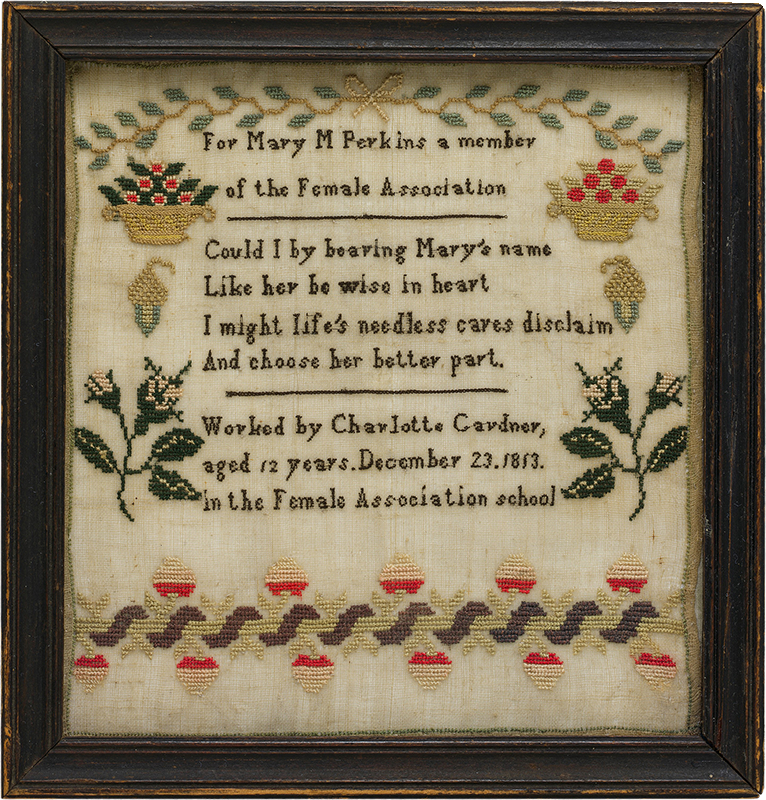Eliza McMannus,
Female Association School, New York, 1813

Among the most significant, aesthetically appealing and interesting of all American Quaker samplers are those made at the Female Association Schools of New York. These samplers were made by young girls from the working class and not as, were generally the case, by the daughters of the well-to-do. The Female Association was established in 1798 by a group of Quaker ladies in New York whose initial mission was to aid the sick and poor of the city. In 1800, the focus of the association turned to education and a charity school was founded in lower Manhattan.
The initial years were interrupted by the yellow fever plague but by 1807 the school was well established and by 1810 it was considered a success, reporting a daily attendance of over 100 schoolgirls. A second school opened in 1810 and a third in 1815, followed by the Flushing Female Association School. These schools educated poor, female children, regardless of their race or religion, and hundreds of girls from impoverished families attended the schools. The curriculum was highly structured, and the schoolgirls were taught needleworking along with academic matters, gaining skills that would increase their opportunities as adults. Some of the students went on to become teachers. In 1828, the Female Association Schools were closed, in part due to the increase in the number of public schools.
The finest of the extraordinary samplers made at the Female Association School are very small and all of the samplers exhibit excellent workmanship. They were frequently made as presentation pieces, generally for the philanthropic Quaker ladies who contributed to the funding and administration of the schools. Only eleven samplers made at the Female Association Schools are currently known to exist; they date between 1813 and 1825.
We are delighted to offer this outstanding Female Association School sampler made by Eliza McMannus, dated December 1813. A beautifully composed sampler, it is one of the earliest and certainly one of the very finest of the group. These samplers all exhibit a classic Quaker aesthetic and most of the samplers were accomplished with extremely fine stitches. Eliza’s needlework is outstanding, with delicate and precise lettering and motifs, yet her sampler has an excellent visual strength.
Other samplers made at the Female Association Schools are in the collections of The Metropolitan Museum of Art, New-York Historical Society, Cooper Hewitt Smithsonian, Wyck Charitable Trust, Monmouth CO Historical Association, and significant private collections. That in The Metropolitan Museum is below and additionally viewed here.

(above) Charlotte Gardner, Female Association School, December 23, 1813,
The Metropolitan Museum of Art
The accompanying information on the Museum site reads,
“The Quakers were the first group to believe that female education should equal that of males, and that children of all classes and races should be educated. To this end, in the early years of the nineteenth century, they formed the first schools for non-elite girls in New York City—the Female Association Schools. These schools became the seed from which New York City’s public school system grew. This example is an extremely rare sampler made in 1813 by a twelve-year-old girl named Charlotte Gardner who attended the first Female Association School.”
We offered this Charlotte Gardner sampler in our catalogue, Samplings, vol. XXXVI (2009). It is highly likely that Charlotte and our samplermaker, Eliza McMannus, were classmates.
As stated, most of the Female Association school samplers were made to be presented to the Quaker ladies who served on the boards and committees. Eliza worked her sampler for Mary Thompson to give as a present to Elizabeth Thompson. Mary Thompson was an important and active member of the Female Association and one of the early supporters of the schools.
Much has been written about the Female Association School samplers by Betty Ring, in Volume II of Girlhood Embroidery: Samplers and Pictorial Needlework 1650 - 1850 (Knopf, 1993), and Glee F. Krueger, A Gallery of American Samplers: The Theodore H. Kapnek Collection (E. P. Dutton in association with the Museum of American Folk Art, 1978). Historical information about the history of the Female Association and its schools can be found in History of the Public School Society of the City of New York by William Oland Bourne (Geo. P. Putnam’s Sons, 1873).
Eliza’s sampler was in the highly regarded collection of Joan Stephens, a renowned sampler and needlework collector. Joan Stephens and Betty Ring were close friends and when Joan’s collection was sold at single owner sale at Sotheby’s (The Joan Stephens Collection: Important Samplers and Pictorial Needlework, January, 1997), Betty Ring wrote a foreword for the catalogue, stating that Joan, “bought representative examples of the most important types of American school girl embroideries .… Her interest in excellence, as well as the historic background of these objects, resulted in an exceptional collection.”
The Eliza McMannus sampler was worked in silk on linen and is in pristine condition. It has been conservation mounted and is in an early 19th century molded and black painted frame, with UV filter Museum Glass. The sampler measures 7¼ inches by 8¼ inches; framed it measures 10 inches by 14¼ inches.
We should note that not all of the Female Association School samplers remain in good condition but they are, nonetheless, considered significant (see the Catherine Parsells sampler at the Cooper Hewitt).
